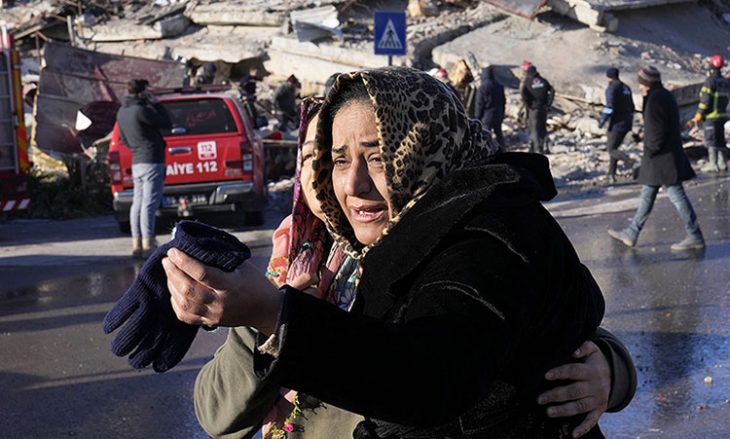When Luke purposed to record his careful investigation into “everything from the beginning” regarding Jesus’ earthly ministry and the initial spread of the Gospel, he wrote two letters or books to a man named Theophilus. We know the first as the Gospel of Luke and the second as the book of Acts.
Acts captures all Luke discovered about the activity within the growing Church after Jesus was taken up to heaven. In it, we learn about Peter’s sermon at Pentecost, his call to proclaim the Good News to the Gentiles (beginning with Cornelius), the choosing of deacons, and the conversion and missionary journeys of Paul.
Acts 11 describes how the persecution of the believers in Judea led to them being scattered far and wide. Some of them made their way to Phoenicia which is the area of Lebanon today, Cyprus which is the large easternmost island in the Mediterranean, and Antioch which was a prominent “crossroads” city in Asia Minor in what was then called Galatia. Verse 21 says “the hand of the Lord was with them, and a large number who believed turned to the Lord.” When the news reached the church elders still in Jerusalem, they sent Barnabas — the proverbial “son of encouragement” — to Antioch. “Considerable numbers” continued to be added to that local church, especially after Barnabas went to Tarsus and brought Paul back to teach and preach in Antioch.
The Bible tells us that “the disciples were first called Christians in Antioch” (Act 11:26).
The Christians of Antioch
If you call yourself a Christian today, you are following in the spiritual heritage of the disciples of Jesus Christ at Antioch. Clearly, God did a mighty work in that city under the leadership of men like Paul and Barnabas. Given its strategic location along major trade routes, Antioch became a center of Christian missionary efforts.
There has been a Christian presence in Antioch for almost 2,000 years. Sadly, the nation surrounding Antioch gave itself over to Islam long ago. The height of Turkish geopolitical power arguably came during the Ottoman empire which was centered in Anatolia and later Constantinople and was renamed Istanbul, specifically under the reign of Suleiman the Magnificent. Pilgrims to Israel will recognize Suleiman as the man who commanded that the Eastern Gate be closed.
Ironically, until late in the 15th Century, just prior to Suliman’s reign, the majority of people in the Ottoman Empire were Christian. But, the past 400 years have seen a marked decline in Christian faith throughout the lands where the Apostles first shared the Gospel. Following the first World War, 1.3 million Turkish Christians were exiled to Greece. Within Turkey itself, it is estimated that up to 3 million native Christians were killed, including over a million Armenians, in what has been called a genocide. Today, Turkey is ruled by a militant Muslim who has reclaimed the famous Hagia Sophia — once the largest church in the world — as an Islamic mosque.
According to the BBC, in just the past 100 years, Turkey’s Christian population has declined from 20% to .2%.
Warning in Tragedy
This brings me back to Antioch, or what has been known in recent years as Antakya. The earthquakes that struck Turkey and Syria on February 6, 2023, virtually destroyed the city. What are we to make of this calamity?
First of all, we should pray for the people of Antioch, both Christians and non-Christians alike. The loss of human life is a tragedy that must not be reduced to a mere statistic. Second, we should support organizations that endeavor to relieve human suffering, especially those that do so in the Name of Christ, such as Samaritan’s Purse, that demonstrate by deed that God’s love is for all people thru Jesus Christ.
But third, we should ponder the truth captured in David’s Psalm repeated in Revelation 16:7 and cited by Abraham Lincoln in his 2nd Inaugural Address: “the judgments of the LORD are true; they are righteous altogether” (Psalm 19:9). Speaking of Revelation, it is Jesus Himself who warned the church at Ephesus that He would “remove their lampstand” unless they repented for leaving their first love.
Hear me carefully. I am not condemning the church at Antioch. And, I’m not equating the church in Antioch with the buildings that were recently knocked down. Rather, I’m referring to the body of Christ that existed in that place. What I am saying is that no church can point to its heritage and claim contemporary health any more than a person can say, “Well, my grandparents were faithful,” and hope to somehow ride to Heaven on their coattails.
The empty church buildings throughout western Europe and the decaying state of denominations in America, let alone our own tragically anti-Christian culture, demonstrate that the visible Church is in decline. While a singular event like an earthquake has not devastated church buildings throughout our nation, too many churches are caving into the spirit of the age and collapsing into post-Christian oblivion.
How Long, O Lord?
Will the Son of Man find faith in America if He tarries much longer (Luke 18:8)? Certainly, not as much as was evident several generations ago. Every statistic tells the same story — our lampstand is being removed.
A dramatic judgment may fall upon our land before the Lord’s return. If it does, we will still confess that “the judgments of the LORD are true; they are righteous altogether.”
On a much more personal level, what about you? What is the status of your family? How is your faith? Are you standing firm on the Rock? Or, are you just one tremor away from destruction?
Be a living stone built upon the precious Corner Stone Who will never disappoint (1 Peter 1:4-6).
Until Christ comes… Godspeed!







